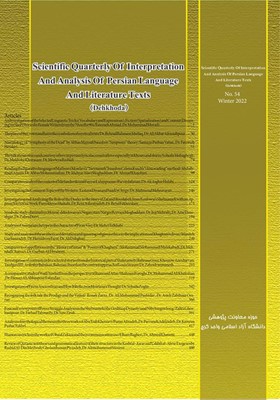Investigation of contrasts in five selected stories from the historical part of Shahnameh (Bahram Gour, Khosrow Anoshirvan, Yazdgerd III, Ardeshir Babakan, Bahman) based on the contrast approach of Louis Strauss
Subject Areas : Epic (with literary and artistic features)
1 - Assistant Professor, Department of Persian Language and Literature, Farhangian University of Kerman, Kerman, Iran.
Keywords: Contrast, Historical section of Shahnameh, Levi Strauss, story, Confrontational motives,
Abstract :
In this article, we have examined the contrasts in five selected stories from the historical part of Shahnameh (Bahram Gour, the reign of Khosrow Anoshirvan, Yazdgerd III, Ardeshir Babkan, Bahman) based on the contrast approach of Louis Strauss. The research method is library and based on document research and its type is analytical-descriptive. The study of confrontation in the studied stories shows that the element of confrontation in these stories is very prominent and bold, and in fact the plot of each of these historical stories is based on confrontation. The type of confrontation in these stories, due to their historical nature, is mainly the type of confrontation of human characters. There are other confrontations besides the confrontation between human characters in these stories, among which we can see the confrontation of ideologies, justice and oppression, moral virtues and vices, the confrontation of human traits such as warfare and courage with weakness and incapacity, racial and ethnic confrontation and things like that were mentioned.In general, although the selected stories are historical stories, the components of Levi-Strauss's approach and theory can be seen in them, and the motivation of these characters for confrontation is only the motivations mentioned in the books. It is not historical, but ideals and goals, as well as their personality type and psychological characteristics, have a direct impact on these confrontations.
کتابها
آموزگار، ژاله (1380) دوگانگی نیکیها و بدیها و برادران دروغین نیکیها در اخلاق زرتشتی، تـهران: اساطیر.
استروس، لوی (1386) توتمیسم، ترجمۀ مسعود راد، تهران: توس.
استروس، لوی (1385) اسطوره و معنا، گفتگوهایی با لوی استروس، ترجمۀ شهرام خسروی، تهران: مرکز.
اسلامی ندوشن، محمد علی (1376) زندگی و مرگ پهلوانان در شاهنامه، تهران: شرکت سهامی انتشارات.
برتنس، هانس (1391) مبانی نظریۀ ادبی، ترجمۀ محمدرضا ابوالقاسمی، تهران: ماهی.
بهار، مهرداد (1389) پژوهشی در اساطیر ایران، تهران: آگاه.
پیشگاهی فرد، زهرا؛ قره بیگی، مصیب (1392) جغرافیای پساساختارگرا، تهران: نشر زیتون سبز.
جلیلیان، شهرام (۱۳۹۶) تاریخ تحولات سیاسی ساسانیان، تهران: سمت.
شاربونیه، ژرژ (1372) مردمشناسی و هنر، گفت و شنودی با لوی استروس، ترجمۀ حسین معصومی همدانی، تهران: گفتار.
صفا، ذبیحالله (۱۳۶۳) حماسهسرایی در ایران، تهران: امیرکبیر.
فردوسی، ابوالقاسم (1371) شاهنامه، تصحیح جلال خالقی مطلق، 8 جلد، تهران: نشر نگاه،.
فردوسی، ابوالقاسم (1380) شاهنامه فردوسی، بر اساس نسخه نه جلدی چاپ مسکو، تهران: ققنوس.
فردوسی، ابوالقاسم (1386) شاهنامه، به اهتمام جلال خالقی مطلق، با همکاری محمود امیدسالار و ابوالفضل خطیبی، تهران: فروزش.
لیچ، ادموند (1350) لوی استروس، ترجمۀ حمید عنایت، تهران: خوارزمی.
وایزمن، بوریس و جودی گووز (1392) لوی استروس، ترجمۀ نورالدین رحمانیان، تهران: پردیس.
مقالات
عبادی جمیل، سعید، رضایی دشت ارژنه، محمود، قلعه خانی، گلنار. (1395). بررسی اسطورۀ ضحاک بر اساس ساختار تقابلهای دوگانۀ کلود لویاستروس. جستارهای نوین ادبی، 49(4)، 67-92. doi: 10.22067/jls.v49i4.61660.
معماریان، انسیه. (1390). خیانت در شاهنامه (با نگاهی به دو داستان رستم و شغاد و سیاوش و سودابه). تفسیر و تحلیل متون زبان و ادبیات فارسی (دهخدا)، 3(10)، 163-202.
_||_Books
Amoozgar, Jaleh (2001) The Duality of the Good and the Bad and the False Brotherhood of the Good in the Zoroastrian Ethics, Tehran: Myths.
Bertens, Hans (2012) Fundamentals of Literary Theory, translated by Mohammad Reza Abolghasemi, Tehran: Mahi.
Charbonnier, George (1993) Anthropology and Art, Interview with Levi Strauss, translated by Hossein Masoumi Hamedani, Tehran: Speech.
Eslami Nodooshan, Mohammad Ali (1997) The Life and Death of Heroes in the Shahnameh, Tehran: Publishing Company.
Ferdowsi, Abolghasem (1992) Shahnameh, edited by Jalal Khaleghi Motlagh, 8 volumes, Negah Publishing, Tehran.
Ferdowsi, Abolghasem (2001) Ferdowsi Shahnameh, based on the nine-volume edition published in Moscow, Tehran: Phoenix.
Ferdowsi, Abolghasem (2007) Shahnameh, by Jalal Khaleghi Motlagh, in collaboration with Mahmoud Omidsalar and Abolfazl Khatibi, Tehran: Foroozeh.
Jalilian, Shahram (2017) History of Sassanid political developments, Tehran: Samat.
Leach, Edmund (1971) Levi Strauss, translated by Hamid Enayat, Tehran: Kharazmi.
Madibahar, Mehrdad (2010) Research in Iranian mythology, Tehran: Agah.
Pishgahi Fard, Zahra, Qarabeigi, Mosayeb (2013) Poststructural Geography, Tehran: Green Olive Publishing.
Safa, Zabihullah (1984) Epic in Iran, Tehran: Amirkabir.
Strauss, Levy (2006) Myth and Meaning, Conversations with Levy Strauss, translated by Shahram Khosravi, Tehran: Markaz.
Strauss, Levy (2007) Totism. Translated by Massoud Rad, Tehran: Toos.
Weisman, Boris and Judy Goz (2013) Levi Strauss, translated by Noureddin Rahmanian, Tehran: Pardis.
Articles
Ebadijamil, S., Rezayi Dasht Arzhane, M., & Ghale Khani, G. (2016). Analysis of the Myth of Zahhak: The Structure of Dual Contrast of Levi-Strauss in Focus. Literary Studies, 49(4), 67-92. doi: 10.22067/jls.v49i4.61660.
Me’marian, E. (2012). Reachery in Shahnameh( By the glance to two stories, Rostam and Shaghad, Siyavash and Sodabeh). Interpretation and Analysis of Persian Language and Literature Texts (Dehkhoda), 3(10), 163-202.

